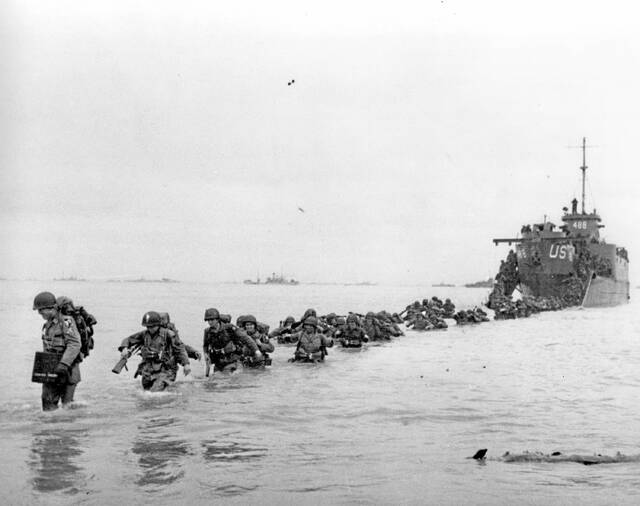https://naviga.triblive.com/opinion/max-hastings-why-we-commemorate-d-day-80-years-later/
Max Hastings: Why we commemorate D-Day, 80 years later

The former Western allies will shortly begin commemorating the 80th anniversary of their greatest World War II achievement, the June 6 landings in Normandy, forever famed as D-Day.
The pomp and circumstance of the grand events to be attended by President Joe Biden and other national leaders are entirely justified by the magnitude of that endeavor.
More than 40 years ago, while writing a book about the campaign, I had the privilege of meeting many veterans — American, British, Canadian, Polish, French, German.
I remember in particular an exuberant New Yorker, a former shipping clerk named Lindley Higgins, who sought to strip the story of an excess of romance: “We were a singularly callous and unfeeling group of young men.” Aged 19, in the weeks beforehand, he found it hard to grasp the reality of what was coming: “Me, Lindley Higgins, from Riverdale in the Bronx, was about to invade France. It was a problem that my mind, in its then state of maturity, couldn’t possibly cope with.”
And so it was for a vast number of the 130,000 men who landed from the wind-whipped sea, plus 20,000 who dropped from the air, on that cloudy day. On the evening of June 5, the colonel of a parachute battalion about to emplane told his men: “We are history.” But few of those whom he addressed could think beyond that night, and the chances of their own survival.
Steven Spielberg’s terrific D-Day movie “Saving Private Ryan” depicts Hitler’s forces deploying their biggest Panzers against American troops, yet during the first battles ashore, the only German tanks then on the western flank were recycled French and Czech models. So successful were allied deception operations — much more influential than the air attacks on French railways — that into July Hitler kept some of his best formations in the Pas de Calais, about 200 miles north, awaiting a second invasion.
But all this wasn’t known back then to allied warlords and their soldiers, so fearful of the huge prospective consequences of failure. “Why are we trying to do this?” cried Winston Churchill in a February 1944 spasm of alarm about the planned invasion, which caused him momentarily to propose an alternative landing in Portugal.
I have always believed that, had it not been for the ironclad determination of the US chiefs of staff, there would have been no D-Day until 1945.
As it was, minutes after midnight on June 6, one British and two American airborne divisions began to jump into Normandy, and almost immediately to fight. Paratrooper James Byrom spoke French and was thus tasked by comrades to knock on the front door of the first house they reached: “At the sight of the motherly, middle-aged peasant, the gulf of the years disappeared and I might have been back in 1939, an English tourist on a walking tour dropping in to ask for a glass of cider and some camembert: ‘Excusez-nous, Madame. Nous sommes les parachustistes anglais faisant partie de Débarquement Allié’.’”
‘There was a moment of scrutiny, then the woman folded me in her arms. The tears streamed down her face, and in between kisses, she was shouting for her husband, for lamps, for wine…We found ourselves — an evil-looking group of camouflaged cutthroats — surrounded and overwhelmed by the pent-up emotion of four years.”
Two hours after dawn, the infantry stormed ashore, on five beaches across a 50-mile front. The American “Bloody Omaha,” where the invaders encountered the toughest resistance from Germans entrenched on bluffs above, still commands much of the popular attention, influenced by the aforesaid Spielberg portrayal. But we should never forget that overall allied casualties on the day — including those on Omaha — proved to be only a fraction of what the planners had feared.
Though one National Guard unit, A Company of the 116th Infantry, lost 100 men, American dead in the first 24 hours totaled 1,465, including losses to the 82nd and 101st Airborne. The overall allied figure was around 3,000 killed, about the same number of fatalities as allied bombs and shells inflicted upon French civilians on June 6.
Despite the carnage that seemed so terrible to those in its midst, the invasion had succeeded: A secure beachhead was established, and in the days and weeks that followed, far more men died than the 3,000 who perished in the landings.
D-Day was assuredly the decisive military event of war in the West. Moreover, for the British people, it represented the moment of redemption after suffering so much and enduring so many defeats and humiliations on the long road since the European war began Sept. 3, 1939.
The Normandy landings constituted a supreme feat of organization, planning, skills and courage. We are right this week to commemorate the towering achievement, while the last handful of its survivors remain alive to share the memories.
Copyright ©2026— Trib Total Media, LLC (TribLIVE.com)
